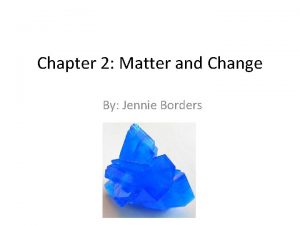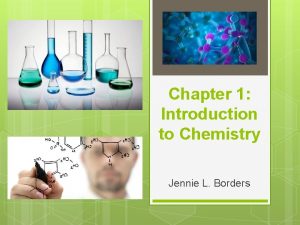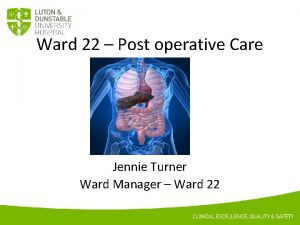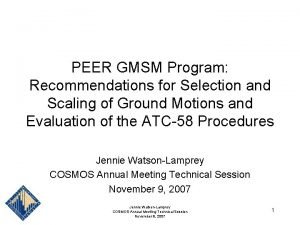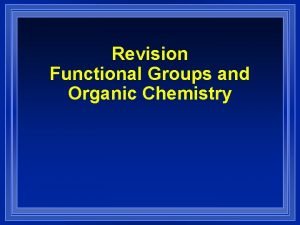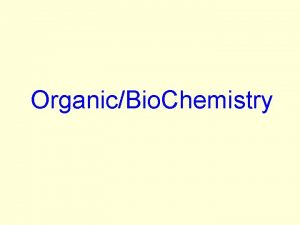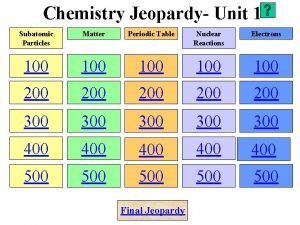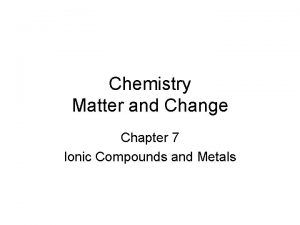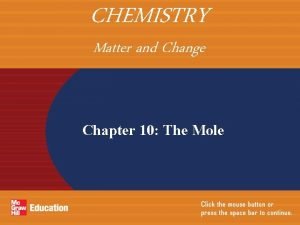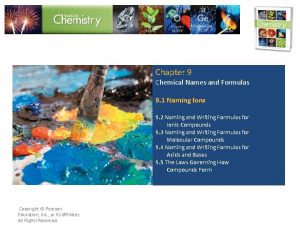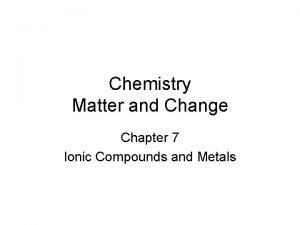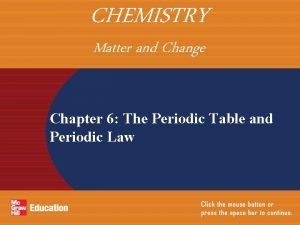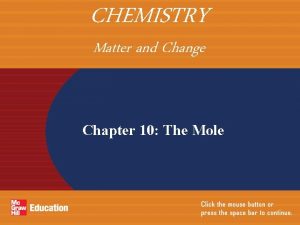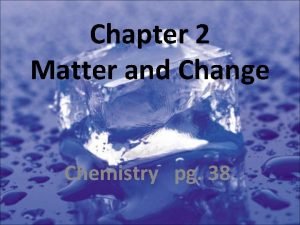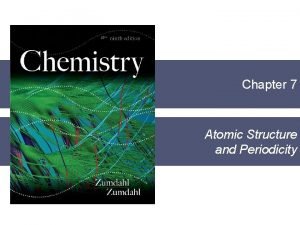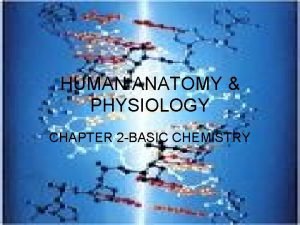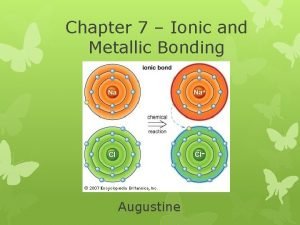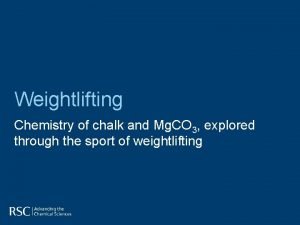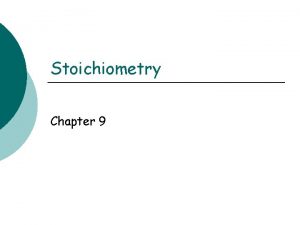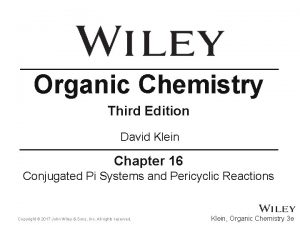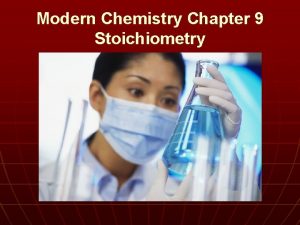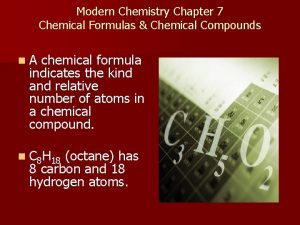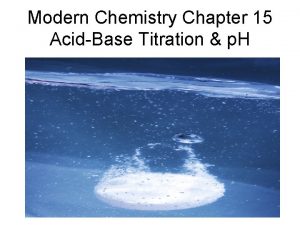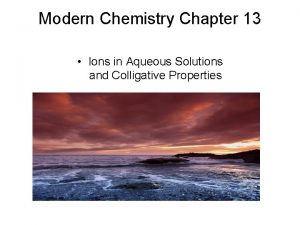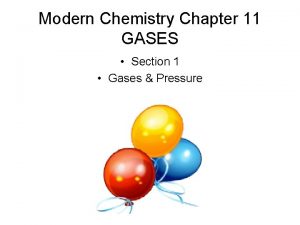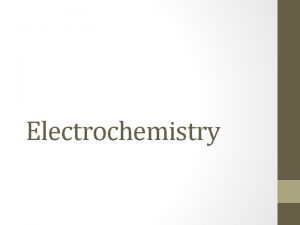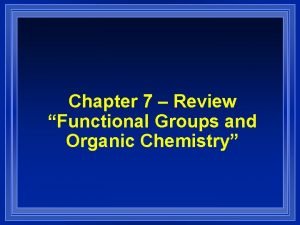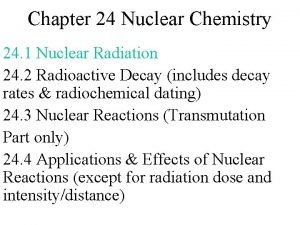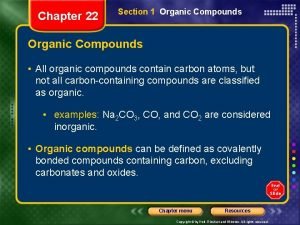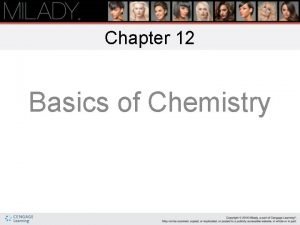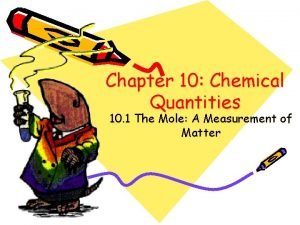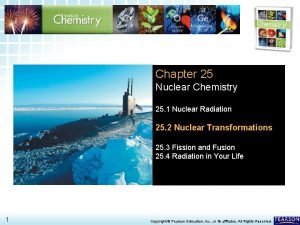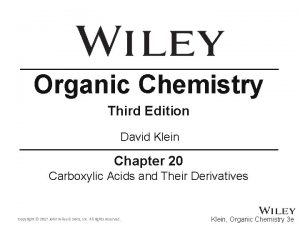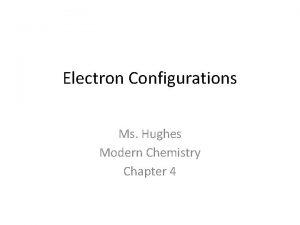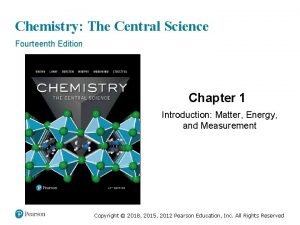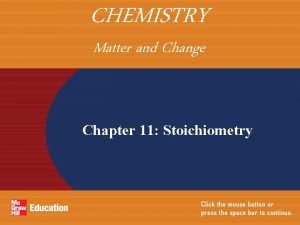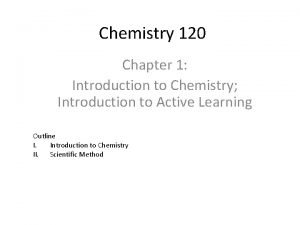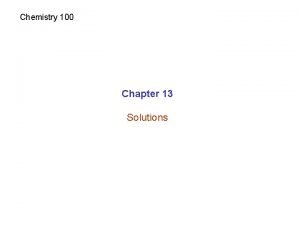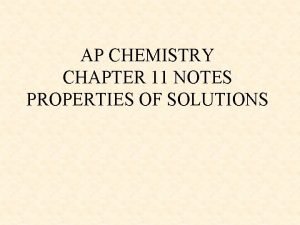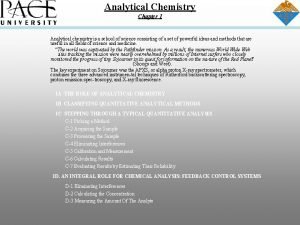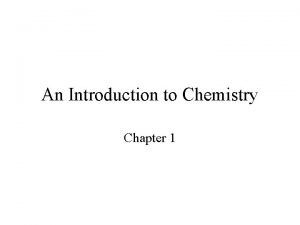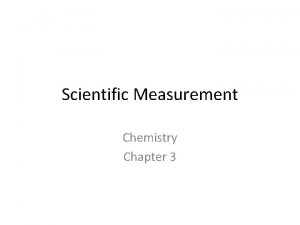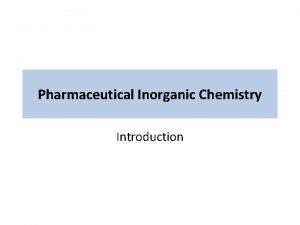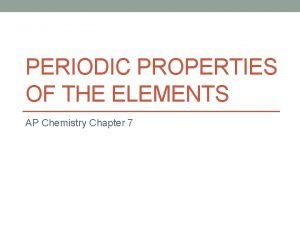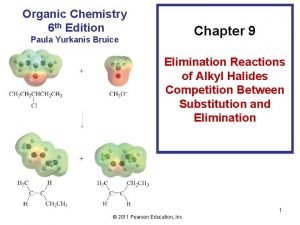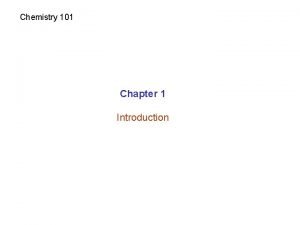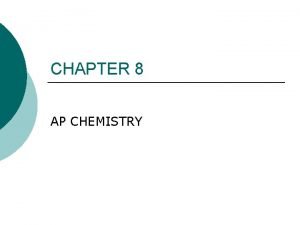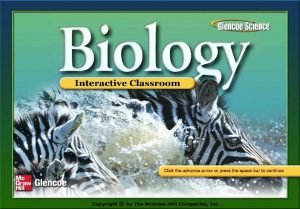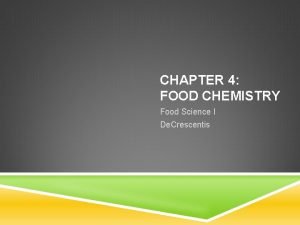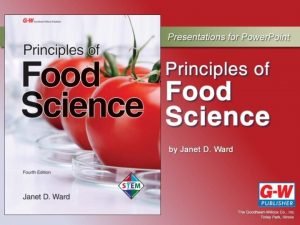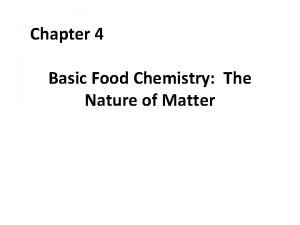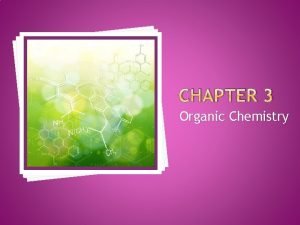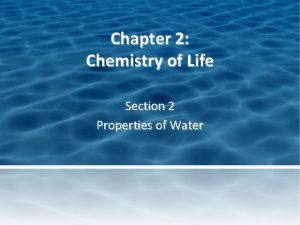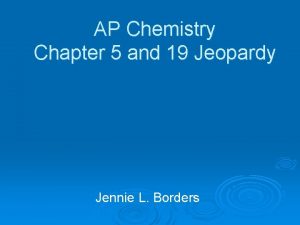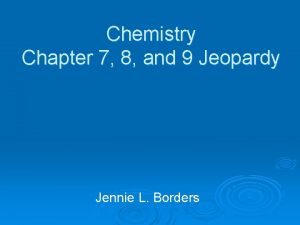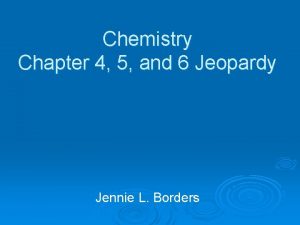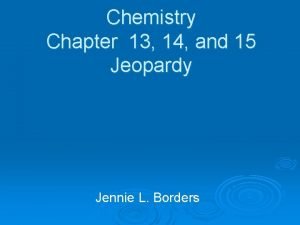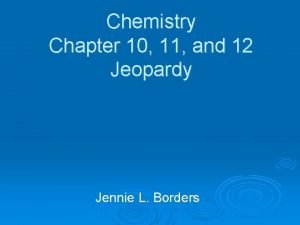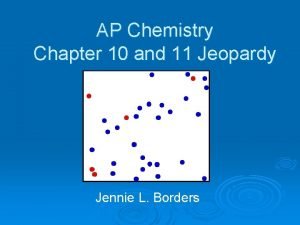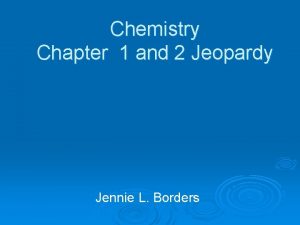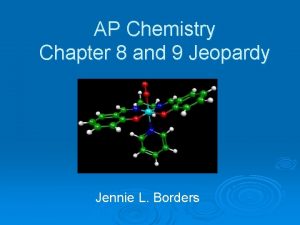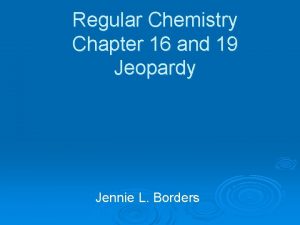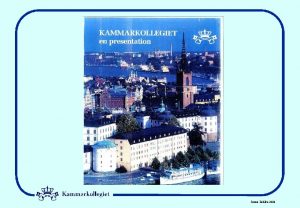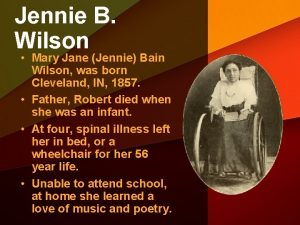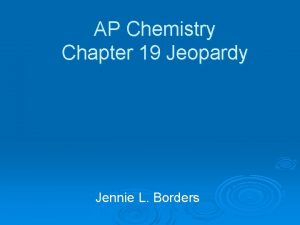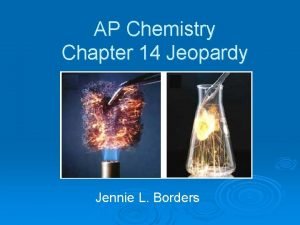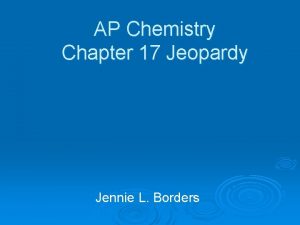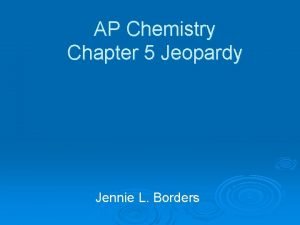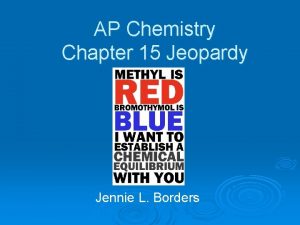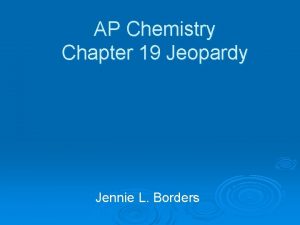Chemistry Chapter 1 and 2 Jeopardy Jennie L

































































- Slides: 65

Chemistry Chapter 1 and 2 Jeopardy Jennie L. Borders

Round 1 – Chapter 1 and 2

Mixtures Elements and Compounds Surprise 100 100 200 200 200 300 300 300 400 400 400 500 500 500 Chemistry Scientific Method Properties of Matter 100 200

Round 2 – Chapter 1 and 2 Click to go to Round 2

Chemistry 100 What is matter? Anything that has mass and occupies space.

Chemistry 200 What is organic chemistry? The study of chemicals containing carbon.

Chemistry 300 What is inorganic chemistry? The study of all chemicals that do not contain carbon.

Chemistry 400 What is analytical chemistry? The study of the composition of matter.

Chemistry 500 What is biochemistry? The study of the processes that occur in living organisms.

Scientific Method 100 What is the scientific method? A logical, systematic approach to solving a scientific problem.

Scientific Method 200 What is a hypothesis? An educated guess based on observations.

Scientific Method 300 What were alchemists trying to accomplish? They were trying to synthesize gold from other metals.

Scientific Method 400 Why were alchemists important? They developed many tools and techniques for using chemicals that we still use today.

Scientific Method 500 What are the 5 steps of the scientific method in order? 1. State the problem 2. Observe 3. Hypothesis 4. Experiment 5. Conclusion

Properties of Matter 100 What is volume? The amount of space an object occupies.

Properties of Matter 200 What is mass? The amount of matter an object contains.

Properties of Matter 300 What is a physical change? A change in the form of a substance that does not change the composition.

Properties of Matter 400 What is an intensive property and what is an example? A property that depends on the type of matter. Ex: boiling point or density

Properties of Matter 500 What is an extensive property and what is an example? A property that depends on the amount of matter. Ex: volume and mass

Mixtures 100 What is a mixture? Two or more components combined (not bonded) causing a variable composition.

Mixtures 200 What is a heterogeneous mixture? A mixture with a noticeable variable composition.

Mixtures 300 What is a homogeneous mixture and what is another name for it? A mixture that appears to have a constant composition. Solution

Mixtures 400 What is filtration? separating a solid from a liquid through the use of filter paper.

Mixtures 500 What is distillation? separating two substances depending on a difference in boiling points.

Elements and Compounds 100 What is an element? the simplest form of matter that has a uniform set of properties (cannot be broken down by physical or chemical processes)

Elements and Compounds 200 What is a compound? A substance that contains two or more elements chemically combined in a fixed proportion.

Elements and Compounds 300 What is a chemical change? A change that alters the composition of a substance.

Elements and Compounds 400 What is the symbol for mercury? Hg

Elements and Compounds 500 What is the symbol for tin? Sn

Surprise 100 What is the known in a math problem? what is given in the problem

Surprise 200 What is the unknown in a math problem? what you are trying to calculate (the variable)

Surprise 300 What are the 3 steps to solving a math problem? 1: Analyze 2: Calculate 3: Evaluate

Surprise 400 What 2 parts must a math answer contain for you to get full credit? a number and a UNIT!!!

Surprise 500 If your heart beats 72 times per minute, how many times will your heart beat per day? 103, 680 beats/day

Mixtures Elements and Compounds Surprise 200 200 400 400 400 600 600 600 800 800 800 1000 1000 Chemistry Scientific Method Properties of Matter 200 400

Chemistry 200 What is chemistry? Chemistry is the study of matter and how it changes.

Chemistry 400 What is physical chemistry? The study of the mechanism, the rate, and the energy transfer that occur when matter undergoes changes.

Chemistry 600 What are the 5 branches of chemistry? organic chemistry inorganic chemistry analytical chemistry biochemistry physical chemistry

Chemistry 800 Under which 2 branches of chemistry would the following situation fall? Factors that affect the breathing rates during exercise. physical chemistry (rate) biochemistry (breathing)

Chemistry 1000 Under which 2 branches of chemistry would the following situation fall? Explain how a lack of calcium can affect the growth and repair of bones. Inorganic chemistry (calcium) biochemistry (bones)

Scientific Method 200 What is the difference between a law and a theory? A law tells WHAT happens, while a theory is our attempt to explain WHY something happens.

Scientific Method 400 What is a manipulated/independent variable? The variable that a researcher changes during an experiment.

Scientific Method 600 What is the responding/dependent variable? The variable that is observed during an experiment.

Scientific Method 800 Theory or Law: The sky is blue because of the bending of light throughout the atmosphere. Theory – it explains WHY the sky is blue

Scientific Method 1000 What is the responding/dependent variable in the following experiment? Adding salt to water to see the effect on the boiling point

Properties of Matter 200 What are the four states of matter? solid liquid gas plasma

Properties of Matter 400 What is a substance? A substance has a uniform composition.

Properties of Matter 600 What is a vapor? A gas that normally exists as a solid or liquid at room temperature.

Properties of Matter 800 Physical change or chemical change? sugar dissolves in water physical change

Properties of Matter 1000 What is a plasma? A gas-like phase made of positive ions and electrons.

Mixtures 200 Homogeneous or heterogeneous? skim milk homogeneous

Mixtures 400 Homogeneous or heterogeneous? sour milk heterogeneous

Mixtures 600 Homogeneous or heterogeneous? wood heterogeneous

Mixtures 800 Homogeneous or heterogeneous? salt dissolved in water homogeneous

Mixtures 1000 Explain how air can be considered both a homogeneous mixture and a heterogeneous mixture? Air is homogeneous because it is a mixture that usually appears the same throughout. Air can be heterogeneous when it contains smoke or pollution.

Elements and Compounds 200 Element, compound, or mixture? brass mixture

Elements and Compounds 400 Element, compound, or mixture? argon element

Elements and Compounds 600 Element, compound, or mixture? carbon dioxide compound

Elements and Compounds 800 Element, compound, or mixture? lake water mixture

Elements or Compounds 1000 How can water be considered both a compound or a mixture? Pure water is a compound. Most “water” is a mixture. Ex: tap water or ocean water

Surprise 200 What is a reactant? The chemicals that you start with in a reaction.

Surprise 400 What is a product? The substances formed at the end of a chemical reaction.

Surprise 600 What is the law of conservation of mass? Mass cannot be created nor destroyed.

Surprise 800 What is a precipitate? A solid formed during a reaction involving liquids.

Surprise 1000 What are the 5 signs of a chemical reaction? 1. production of light 2. precipitate 3. color change 4. temperature change 5. formation of a gas
 Jennie borders chemistry
Jennie borders chemistry Jennie borders chemistry
Jennie borders chemistry Jennie turner
Jennie turner Jennie finch slow motion
Jennie finch slow motion Jennie reid elementary
Jennie reid elementary Jennie ellis australia immigration
Jennie ellis australia immigration Jennie reeves radiographers agency ltd
Jennie reeves radiographers agency ltd Tammi terrell parents
Tammi terrell parents Microalgae
Microalgae Jennie
Jennie Ib chemistry organic chemistry
Ib chemistry organic chemistry Inorganic chemistry vs organic chemistry
Inorganic chemistry vs organic chemistry The periodic table jishka
The periodic table jishka Biology jeopardy questions
Biology jeopardy questions Chemistry matter and change chapter 7
Chemistry matter and change chapter 7 Chemistry matter and change chapter 10
Chemistry matter and change chapter 10 Chapter 8 review chemical equations and reactions
Chapter 8 review chemical equations and reactions Chemistry chapter 9 chemical names and formulas
Chemistry chapter 9 chemical names and formulas 1s 22 s22 p63 s23 p64 s2
1s 22 s22 p63 s23 p64 s2 Chemistry matter and change chapter 6
Chemistry matter and change chapter 6 Chemistry matter and change chapter 10 the mole answer key
Chemistry matter and change chapter 10 the mole answer key Chemistry matter and change chapter 2 answer key
Chemistry matter and change chapter 2 answer key Oxygen periodic trends
Oxygen periodic trends Anatomy and physiology chapter 2
Anatomy and physiology chapter 2 Chemistry chapter 7 ionic and metallic bonding
Chemistry chapter 7 ionic and metallic bonding Is chalk natural or manmade
Is chalk natural or manmade Chemistry chapter 9 stoichiometry
Chemistry chapter 9 stoichiometry Pericyclic
Pericyclic Organic chemistry chapter 1
Organic chemistry chapter 1 Modern chemistry chapter 9 review answers
Modern chemistry chapter 9 review answers Love formula
Love formula Modern chemistry chapter 15 review answers
Modern chemistry chapter 15 review answers Modern chemistry chapter 14 review answers
Modern chemistry chapter 14 review answers Modern chemistry chapter 13
Modern chemistry chapter 13 Modern chemistry chapter 12 test
Modern chemistry chapter 12 test Law of combining volumes
Law of combining volumes Ap chemistry chapter 18 electrochemistry test
Ap chemistry chapter 18 electrochemistry test Chapter 7 chemistry review
Chapter 7 chemistry review Chapter 24: nuclear chemistry answer key
Chapter 24: nuclear chemistry answer key Chapter 22 review organic chemistry section 1 answers
Chapter 22 review organic chemistry section 1 answers Chapter 12 basics of chemistry review questions
Chapter 12 basics of chemistry review questions Chemistry chapter 10 chemical quantities
Chemistry chapter 10 chemical quantities Chapter 25 nuclear chemistry answer key
Chapter 25 nuclear chemistry answer key Carboxylic acid h3o+ reaction
Carboxylic acid h3o+ reaction Modern chemistry chapter 4
Modern chemistry chapter 4 Chemistry the central science 14th edition
Chemistry the central science 14th edition Chapter 11 stoichiometry test answer key
Chapter 11 stoichiometry test answer key Chapter 1 introduction to chemistry
Chapter 1 introduction to chemistry Chapter 13 mixtures and solutions answers
Chapter 13 mixtures and solutions answers Stoichiometry chapter 9 test
Stoichiometry chapter 9 test Ap chemistry chapter 11
Ap chemistry chapter 11 Analytical chemistry chapters
Analytical chemistry chapters Introduction to chemistry chapter 1
Introduction to chemistry chapter 1 Chemistry chapter 3 scientific measurement
Chemistry chapter 3 scientific measurement Pharmaceutical inorganic chemistry chapter 1
Pharmaceutical inorganic chemistry chapter 1 Ap chemistry chapter 7 periodic properties of the elements
Ap chemistry chapter 7 periodic properties of the elements Organic chemistry chapter 9
Organic chemistry chapter 9 Chemistry 101 chapter 1
Chemistry 101 chapter 1 Ap chemistry chapter 8
Ap chemistry chapter 8 Chapter 6 chemistry in biology
Chapter 6 chemistry in biology Chapter 4 basic food chemistry the nature of matter
Chapter 4 basic food chemistry the nature of matter Chapter 4 basic food chemistry the nature of matter
Chapter 4 basic food chemistry the nature of matter Chapter 4 basic food chemistry the nature of matter
Chapter 4 basic food chemistry the nature of matter This name
This name Chapter 2 the chemistry of life section review 2-2
Chapter 2 the chemistry of life section review 2-2 Ap chemistry chapter 6
Ap chemistry chapter 6
